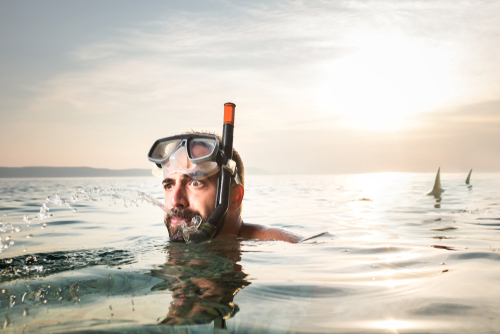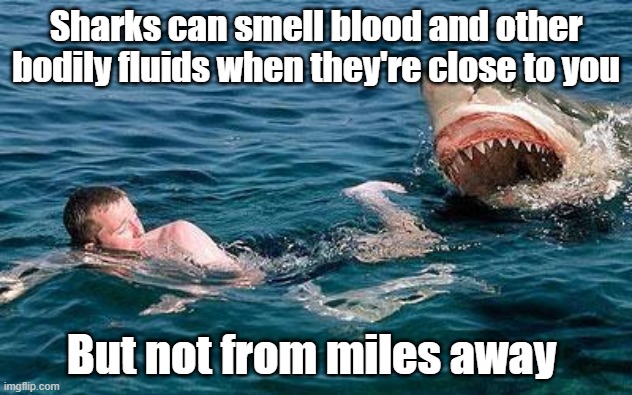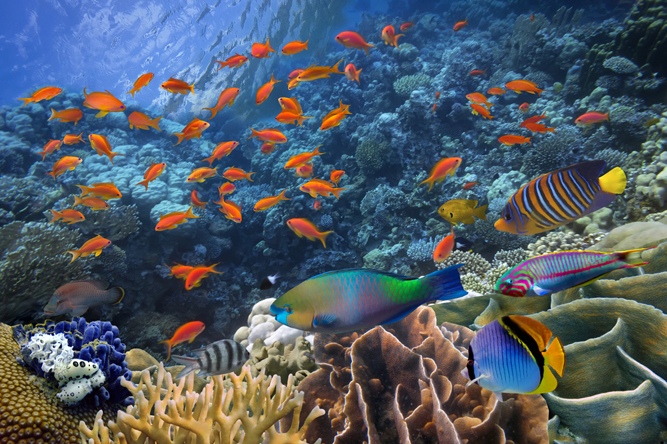Table of Contents (click to expand)
We’ve seen many times that sharks are attracted to blood, so the animals must be able to detect it using their senses: sight, taste, or smell. But can sharks actually distinguish between human blood and other blood?
Multiple movies and shows – the movie “Jaws”, for example – have ingrained in our minds that sharks are attracted to human blood. These bloodthirsty swimmers of the sea never seem to pass on a chance to eat a human, at least according to Hollywood. But does this happen in real life? Or is it just a “reel life” phenomenon?
Frequency Of Shark Attacks On Humans
Media attention to shark attacks makes it seem like they happen a lot, but the frequency of shark attacks on humans is exceptionally low. From a global census, shark attacks on humans cause about 10 deaths each year. Only about 7% of unprovoked shark bites resulted in death globally between 2000 and 2009. This roughly translates to 4.6 fatal bites per year.

Out of five hundred species of sharks, it was found that three sharks—the great white shark, the bull shark and the tiger shark—were responsible for most of the attacks. They cause over 60% of all reported shark bites and 80% of the shark bites that resulted in casualties.
Also Read: Are Piranhas Really That Dangerous?
Can Sharks Smell Human Blood?
Sharks are not particularly attracted to human blood, contrary to what is shown in movies. It’s not actually just blood, but any bodily fluid that might attract sharks. However, they can’t sniff out one drop of blood from miles away. Blood, along with unusual factors like disturbances in the water, can be a possible pull for sharks.

However, this isn’t just specific to humans. A shark can be attracted to a bleeding fish or sea lion too, but there’s a catch. The chances of sharks being attracted to human blood or any other body fluid are much lower.
So, what would attract a shark to the source of blood from so far away? The smell, right?
Sharks can detect odors and they do have a strong sense of smell. Taronga zoo in Australia states that,”[…]Sharks may be attracted to one person to the exclusion of others because the person is bleeding, has urinated in the water, or simply because the person emits a stronger body odor or electromagnetic field.”
However, for a shark to detect these from miles away, the fluid must be strong enough to not be diluted by the enormous amount of water around it. One drop of odor concentration in moderately turbulent flowing water would be diluted from 10-6 to 10-21 in the space of one kilometer. That’s as good as the drop never having existed. Thus, there must be a very large amount of blood for a shark to detect it from miles away.
Some sharks have reportedly swum past other people to seek out a particular individual or a group of swimmers or divers… but why? For their normal body smell to be a reason, the concentration must be very high.
A possible explanation could be this: sharks are more attracted to a person’s activities than their bodily odors.
An Experiment By ex-NASA Engineer
Mark Rober, an ex-NASA engineer and now a science YouTuber, conducted an interesting set of experiments to test whether sharks prefer human blood. He attached pumping devices filled with either cow blood, fish blood, or seawater to three surfboards and then released them into the ocean. The pumping devices would release the fluid into the water as they moved. Over the course of an hour, with the help of a drone, the number of shark visits to each surfboard was observed.
They witnessed 0 shark visits to the surfboard with seawater, 8 shark visits to the one pumping out cow blood, and a monumental 134 visits to the surfboard with fish blood. This also conclusively points out that sharks are more attracted to fish blood than human blood.
However, this can only be taken as an anecdotal academic reference, and is by no means a complete analysis.
Also Read: Can Sharks Change Colors?
What About Menstrual Blood?
So, if any body fluid in a large enough amount and concentration might attract a shark, but what about when a person is menstruating? Is that any different?

Menstrual blood, like other bodily fluids, can be detected by sharks, but there is no positive evidence of it leading to shark attacks. Furthermore, the chances of menstrual blood releasing in the water are low, as the pressure of the water while swimming or diving will temporarily stop one’s menstrual blood flow.
Sharks also do not have any preference for males over females or vice versa. Previous data might suggest that men are attacked more, but that was only because of a lower involvement of women in water activities. More recent data show that women are attacked by sharks as well.
Can Sound Attract A Shark?
We have seen how smell is vaguely able to attract sharks, but does sound have any role to play?
As it turns out, sound is the main cue for a shark to move into an area. However, once a sound is registered and it starts moving towards the source, a shark will rely more on sight than sound.
Sharks are attracted to low-level frequency sounds, especially in the range of 10-50Hz. This is the frequency that is also released by a struggling or injured fish. Tests have concluded that sharks are most sensitive to frequencies between 40 Hz and 800 Hz. They use their lateral line sense organ and inner ears to locate their prey from 250 meters away or more.

A Final Word
As mentioned above, only a handful of species of shark are involved in attacks on humans. Sharks evolved millions of years before humans appeared. Their usual prey include marine animals, such as fish or seals. Human beings are not a part of a shark’s normal diet, so it seems logical that they don’t have much of a taste for us.

If you’re ever out in the ocean, swimming or diving, there is a minuscule chance of you being attacked by a shark and dying, unless you’re already bleeding extensively. Watch out for other animals though! Meanwhile, you can learn more about what makes shark eggs different than other eggs by clicking here!
Also Read: How Did Sharks Survive The Asteroid Impact That Killed The Dinosaurs?
How well do you understand the article above!

References (click to expand)
- Fun Facts About Shocking Sharks | NOAA Fisheries. The National Oceanic and Atmospheric Administration
- Do sharks hunt people? - NOAA's National Ocean Service. The National Ocean Service
- Menstruation and Sharks – International Shark Attack File. The Florida Museum of Natural History
- (2014) Shark Attack Theories - Taronga Conservation Society. The Taronga Conservation Society
- Simpfendorfer, C. A., Heupel, M. R., & Kendal, D. (2021, July 23). Complex Human-Shark Conflicts Confound Conservation Action. Frontiers in Conservation Science. Frontiers Media SA.
